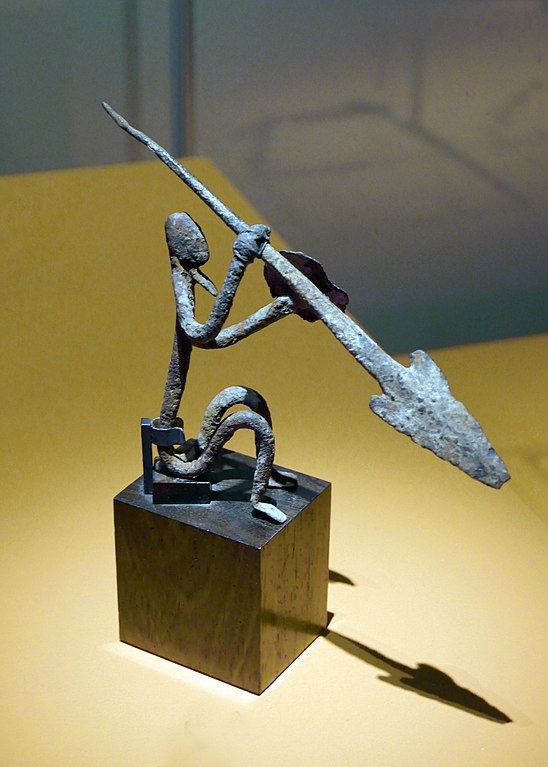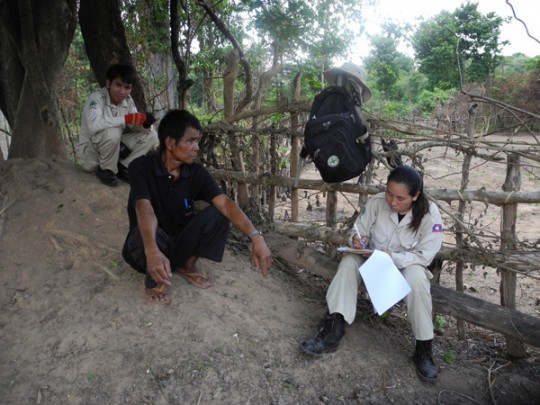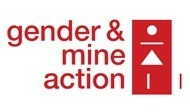

Redressing the balance: how a small Swiss NGO attempts to ensure the full participation of both genders in humanitarian mine action, as beneficiaries and as actors, often in parts of the world torn asunder by armed conflict and blighted by poverty.
Geneva Business News was interested in the career paths of people working in a specialised niche: how and why did they become “gender specialists”?
What is GMAP?
The Gender and Mine Action Programme (GMAP) was launched in 2006 as a project of the Swiss Campaign to Ban Landmines aiming to contribute to the implementation of UN Security Council 1325 on Women, Peace and Security, which mentioned that "mine clearance and mine awareness programmes take into account the special needs of women and girls." Today, GMAP defines its vision as: "A world in which women, girls, boys and men are safe from mines/explosive remnants of war (ERW) and participate and benefit equally from mine action."
GMAP is today an independent NGO, with two full-time staff. Although initially set up by the Swiss Campaign to Ban Landmines, it very quickly became an integral part of "International Geneva", housed in the city’s brand-new "Maison de la Paix" and hosted by the Geneva International Centre for Humanitarian Demining (GICHD), which also generously looks after GMAP's accounting and administrative needs. This allows GMAP to concentrate fully on its core task, as well as to seek funds – a major preoccupation for any NGO.
GMAP gathers and disseminates information on gender in mine action, notably through research, publications and training workshops. For example, in 2013 over 570 men and 230 women from more than 50 different organisations in ten different countries attended 17 training workshops and 9 presentations. It also assists partner organisations to implement gender mainstreaming, through evaluations, recommendations, strategy development and action planning. The focus is on identifying the opportunities that exist for gender mainstreaming in specific country contexts. GMAP also lobbies governments to promote gender awareness and obtain State support for gender issues.
Demands on GMAP have been on the increase over the years. Limited funds and difficulties in attracting new or complementary donors have meant that the organisation has lacked the human resources required meet all the requests – even considering that often, GMAP is able to invoice its interventions to the requesting parties.
A few definitions
"The objectives of humanitarian action are to save lives, alleviate suffering and maintain human dignity during and in the aftermath of man-made crises and natural disasters, as well as to prevent and strengthen preparedness for the occurrence of such situations."
Mine action
"...activities which aim to reduce the social, economic and environmental impact of mines, and ERW including unexploded sub-munitions." The International Mine Action Standards (IMAS) have been adopted by the international community. Mine action is mostly concerned with the protection of populations through the thorough removal of anti-personnel landmines and other "explosive remnants of war" (ERW). The International Campaign to Ban Landmines (ICBL) bases its action on the premise that weapons which had an impact long after hostilities were over, often laying dormant in the soil for decades before being triggered, should be eradicated.
Gender issues and gender mainstreaming
"Gender" has become, in the last forty years, a much used and misused term, generating impassioned debate sometimes with a great degree of confusion. Some people have used "gender" to understand how social roles are established and performed, and others have then opposed "gender issues" on the basis that they risked being forced to abandon traditional sexual identities.
In the humanitarian context at least, gender issues are concerned with the recognition that each person, whatever his or her sex and age, has a role to play in society and benefits from the full range of human rights. They are premised on the idea that society, when it integrates all of its members, is healthier than a society which discriminates against or ignores some people. Integration of all members means acceptance of each individual, and allowing each individual to participate in society as she or he deems fit. Gender mainstreaming, therefore, is the action of taking into account the different needs, perspectives, priorities, knowledge and capabilities of women, girls, boys and men from diverse backgrounds.
Gender issues and humanitarian mine action
"Due to their specific roles and responsibilities within communities and families, women, girls, boys and men are affected differently by landmines and ERW, and therefore need to be assisted in different ways. Their mobility patterns often mean that different age and sex groups hold different information on contamination and have different exposure to landmines and explosive remnants of war (ERW), and therefore might have different priorities for survey and clearance. The risk of becoming a victim, the ability to access medical and psychological services, long term reintegration, risk education and awareness, and the likelihood of getting employed in mine action are also different."
In the case of mine action, gender mainstreaming means that the actors seek to work with all members of communities, whether as beneficiaries of humanitarian mine action or as staff.
Naveed Nawin, mine action specialist and consultant for gender issues
 Naveed Nawin is Senior Project Manager at Demining Agency for Afghanistan (DAFA), and was hired in 2013 as consultant for GMAP. We were curious as to how a male in Afghanistan could be a specialist in gender issues, so we interviewed him to find out. The interview did not quite go as expected. Excerpts:
Naveed Nawin is Senior Project Manager at Demining Agency for Afghanistan (DAFA), and was hired in 2013 as consultant for GMAP. We were curious as to how a male in Afghanistan could be a specialist in gender issues, so we interviewed him to find out. The interview did not quite go as expected. Excerpts:
GMAP selected me more on the basis of enthusiasm than experience! When teaching English in Kabul, I had my first taste of gender issues, as the Union of Afghanistan Youth tasked me with including equal opportunity concepts into our code of conduct and other basic documents. It was very basic! Then, in DAFA, where I am responsible for operations and planning, we learned to incorporate gender-sensitive concepts into the proposals for donors – again, very basic. How do we set the priorities? How do we deal with, gather information from, the whole community? I was really keen to work in this manner.
Everything changed after GMAP came and carried out its assessment. I knew Afghan culture well and my work experience had given me a very extensive view of the problem. It is a big challenge to convince people that women can and should contribute to the workplace, especially in non-traditional activities.
With GMAP, we proved that demining was not the job of men only. Working for and with GMAP, I could better grasp the solutions that we could propose, how better to mainstream gender issues. Indeed, holding a workshop on gender was an eye-opener: all my colleagues were secretly in favour of gender mainstreaming, but out of a sense of “what will my colleagues say”, none had dared to express it. And today, as I have gained the reputation as a specialist, colleagues come to me for ideas on how to better mainstream gender into their work.
Initially, it was tough. Some colleagues might take the attitude that I was working for Western ideas, or that I was working for women. When we held our workshops, we invited an imam (religious leader) to come and talk to the participants. You see, in Islam, « gender » is both a question of equality and of equity. We recognise the differences between males and females, each should be respected, and all should play their part in society, if society is to be healthy and whole. We also believe in the implementation of the Universal Declaration of Human Rights. In Afghanistan, we have a number of cultures, and some of them are indeed very hostile to women’s rights – but, we could demonstrate that was not in accordance with our religious teachings. Culture, not Islam, is the obstacle. In some parts of Afghanistan, gender issues are seen as a zero-sum game: if women gain power, men will lose it. It is our belief that we can change this.
Certainly, as concerns mine action in Afghanistan, GMAP helped us understand that we could find our own solutions to integrating both men and women in the struggle against anti-personnel mines. I would raise both hands if asked to do this again.
I would like to finish this interview by thanking my colleagues, and all those around us, for their support and their commitment in this issue.

An internship with GMAP?
The question of internships for young professionals is one that many undergraduates or recent graduates face, and this is especially true in the non-profit sector. Most internships are unpaid, and there is another downside: many employers refuse to consider them as “work experience”. When Geneva Business News interviewed two interns at GMAP, we did not find a story of unbridled exploitation: on the contrary, both interns were very positive about their experience. One of them, Will Hankey, had extended his internship, as he still had some time available prior to resuming his studies (Irina Blanche, on the other hand, had to end her time at GMAP, in order to concentrate on her search for a job).
We asked them how they had arrived at GMAP, what their experience there had been, and what they could say about their internship.
Ms Blanche had obtained a Master’s degree in humanitarian action in Aix-en-Provence in June, and was looking for job opportunities in France or abroad, in development work. She had interned in Bolivia with an NGO dealing with domestic violence against women and children, and followed this up with an internship with UN women in Kosovo. Her interest in gender issues was definitely piqued, and she jumped at the chance to do this internship.
Mr Hankey had studied his Bachelor’s at the University of Exeter, with a view to have a career in academia. He applied for this internship because of the emphasis on gender, and the fact that no specific knowledge of mine action was needed. At university, he had had some limited exposure to gender studies; his interest at GMAP was to gain much more practical knowledge.
Ms Blanche’s tasks included research into pregnancy and maternity leave, and parental rights for staff working in mine action, whereas Mr Hankey conducted research into the impact of mixed teams on land release activities, developed a booklet on gender-sensitive indicators intended for programme managers, and drafted an article on the inclusion of gender and disability in recruitment and programme management. They also prepared background information and logistical arrangements for staff prior to trips abroad, and helped prepare reports, guidelines, presentations and training materials.
The interns appreciated their inclusion as full members of the team, the responsibilities that they had been given, and the fact that the learning curve was very sharp. Mr Hankey was cognizant of the opportunities to be published: GMAP’s policy being to extend full recognition of the tasks undertaken, always encouraged interns to sign or co-sign research or publications that they had worked on. Some previous interns had even been given opportunities to travel.
Notwithstanding the mixed blessing of having internships on their CV, Ms Blanche was categorical: “I have been granted many more job interviews since this internship began”. A quick look at the current situation of recent interns shows that there are indeed good results – of the four names we verified, one is an ICRC delegate, another is at the Global Fund, a third at the United Nations; as to the fourth, she is now a consultant on gender issues.
A positive model
GMAP fills a niche, a very small niche, and the staff needs to be on all fronts with limited means. Consultants with specialized knowledge and interns with a capacity to learn are therefore very precious, contributing their time and skills. Not all employers are cognizant of the quality work that interns bring such NGOs, but GMAP’s policy of empowering their own interns, by giving them interesting tasks, allowing them to publish under their own names, and training them in a specialized field is certainly a positive model.
Note: GMAP is creating a roster of gender and mine action experts... candidates welcome!
Contact information
Website: http://www.gmap.ch
Contact: info@gmap.ch
The interviewees can be found on LinkedIn:
Naveed Nawin: af.linkedin.com/pub/naveed-nawin/86/573/937
Irina Blanche: ch.linkedin.com/pub/irina-blanche/53/10b/501/en
Will Hankey: ch.linkedin.com/pub/william-hankey/2a/63a/518
References:
In 2014, GMAP is funded by the Australian Department of Foreign Affairs and Trade, the Swiss Federal Department of Foreign Affairs, the Ministry of Foreign Affairs of the Netherlands, and the United Nations Mine Action Service, for a total budget of about CHF 250'000.-.
In PRINCIPLES AND GOOD PRACTICE OF HUMANITARIAN DONORSHIP, 17 June 2003,http://www.goodhumanitariandonorship.org/Libraries/Ireland_Doc_Manager/EN-23-Principles-and-Good-Practice-of-Humanitarian-Donorship.sflb.ashx
http://www.mineactionstandards.org/glossary/source/default/term/mine/
Explosive Remnants of War
http://www.icbl.org/intro.php
http://en.wikipedia.org/wiki/Gender_issues
Thanks Martin for this interesting article, demonstrating that one topic can be viewed from so many angles - and can provide lessons in all of them! I had never considered mine decontamination from the perspective of gender - different mobility patterns for men and women, boys and girls... An eye-opener.
Thank you for interviewing these people and sharing their insights. I agree with Michal that your article has been an eye-opener!